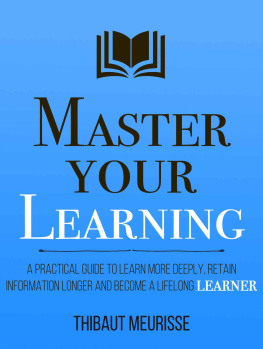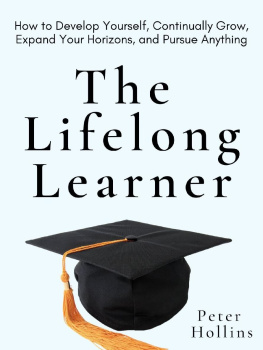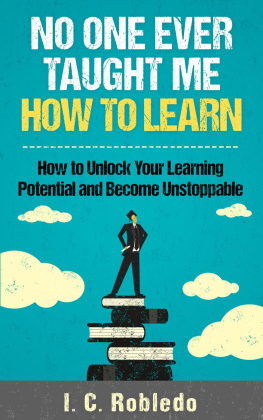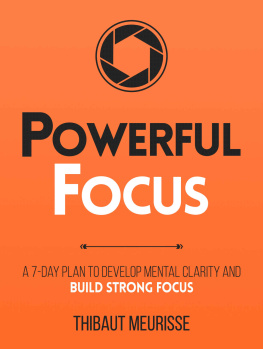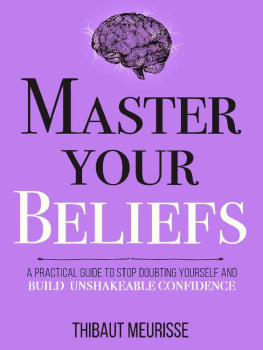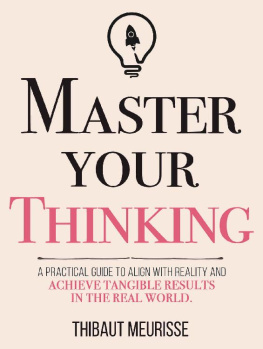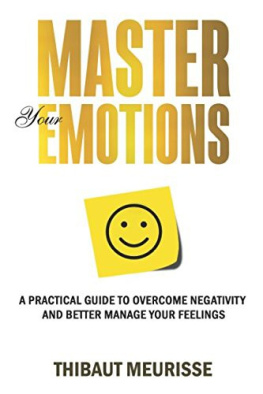Meurisse - Master Your Learning: A Practical Guide to Learn More Deeply, Retain Information Longer and Become a Lifelong Learner
Here you can read online Meurisse - Master Your Learning: A Practical Guide to Learn More Deeply, Retain Information Longer and Become a Lifelong Learner full text of the book (entire story) in english for free. Download pdf and epub, get meaning, cover and reviews about this ebook. year: 2022, genre: Romance novel. Description of the work, (preface) as well as reviews are available. Best literature library LitArk.com created for fans of good reading and offers a wide selection of genres:
Romance novel
Science fiction
Adventure
Detective
Science
History
Home and family
Prose
Art
Politics
Computer
Non-fiction
Religion
Business
Children
Humor
Choose a favorite category and find really read worthwhile books. Enjoy immersion in the world of imagination, feel the emotions of the characters or learn something new for yourself, make an fascinating discovery.
- Book:Master Your Learning: A Practical Guide to Learn More Deeply, Retain Information Longer and Become a Lifelong Learner
- Author:
- Genre:
- Year:2022
- Rating:3 / 5
- Favourites:Add to favourites
- Your mark:
- 60
- 1
- 2
- 3
- 4
- 5
Master Your Learning: A Practical Guide to Learn More Deeply, Retain Information Longer and Become a Lifelong Learner: summary, description and annotation
We offer to read an annotation, description, summary or preface (depends on what the author of the book "Master Your Learning: A Practical Guide to Learn More Deeply, Retain Information Longer and Become a Lifelong Learner" wrote himself). If you haven't found the necessary information about the book — write in the comments, we will try to find it.
Meurisse: author's other books
Who wrote Master Your Learning: A Practical Guide to Learn More Deeply, Retain Information Longer and Become a Lifelong Learner? Find out the surname, the name of the author of the book and a list of all author's works by series.
Master Your Learning: A Practical Guide to Learn More Deeply, Retain Information Longer and Become a Lifelong Learner — read online for free the complete book (whole text) full work
Below is the text of the book, divided by pages. System saving the place of the last page read, allows you to conveniently read the book "Master Your Learning: A Practical Guide to Learn More Deeply, Retain Information Longer and Become a Lifelong Learner" online for free, without having to search again every time where you left off. Put a bookmark, and you can go to the page where you finished reading at any time.
Font size:
Interval:
Bookmark:
I.
II.
III.
IV.
V.

We now accept the fact that learning is a lifelong process of keeping abreast of change. And the most pressing task is to teach people how to learn.
Peter Drucker, management consultant.
In many aspects, learning is a natural process. As human beings, we are highly adaptive creatures able to learn anything we need to ensure our survival. Yet, nowadays, the world has become more complex. While learning is more important than ever, it is also more complicated - and often much more abstract.
Many people struggle to find the exact information they need to reach their learning goals, let alone understand things at a deep enough level to remember them.
This is where Im supposed to tell you that Im a far better learner than you. Unfortunately, that is not the case. When I began my research to write this book, I read an entire book on learning in a couple of sittings. A few weeks later, when I took a piece of paper and wrote down everything I could remember, Im ashamed to admit it wasnt much. I found it impossible to remember even one specific thing from the book. After a few minutes staring at a blank page, I gave up. Then, I looked at the books Table of Contents, hoping it would jog my memory. It did, but only marginally.
Although I had spent hours reading the book, I couldnt recall the structure, the main ideas, or the concepts. Sure, since I had prior knowledge about the topic, I could deduce some of the points covered, but I couldnt remember anything specific. Nor could I recall a concrete example.
Does this sound familiar?
Now, reading a book only takes a few hours, but what about spending years sitting at a desk for hours every day? That is, what about school? How much do you remember from all those years spent studying at school? If you had to write down everything you remembered from primary school, junior high school, high school, or even university, how much could you recall?
The truth is, eventually, we will forget most of the things we learn. And it is not a bad thing. In many aspects, we can say that learning is about forgettingforgetting the unnecessary things so that we can remember a minority of things that are truly important to us.
Contrary to popular belief, your brain isnt designed to remember everything youve ever heard, felt, smelled, tasted or touched. Sure, I could tell you that your subconscious is powerful almost beyond limit, but will it help you become an effective learner? I doubt it. I also wont tell you how to triple your reading speed and read a book in a day. Information overload is one of the main reasons people struggle to learn effectively.
Today, we are constantly incentivized to consume more information. Meanwhile, we fail to spend enough time and effort to build the strong foundations of learning. In the absence of solid foundations, we have nothing on which to build additional knowledge. As a result, major concepts, laws or theories are drowned under a sea of random facts, useless statistics or irrelevant stories.
Sadly, before weve had time to digest information, we find ourselves already having jumped onto the next book or video. While these efforts give us the illusion were gaining knowledge, it couldnt be further from the truth. At best, were accumulating facts, not knowledge; let alone wisdom.
When it comes to learning, the issue isnt poor memory, slow reading or lack of information; it is failing to identify the most relevant information, and failing to encode it properly so that we can learn and remember.
In this book, well see how you can alter your approach to learning and become a truly effective learner.
In Part I. Building Solid Learning Roots, Ill provide you with the key components needed to foster effective learning. Well review major misconceptions and discuss what learning actually is. Ill also introduce six common learning challenges. In addition, well see how you can develop a powerful mindset that will help you learn anything you desire. Finally, Ill show you how to prioritize your learning to produce optimal results.
By the end of Part I, youll have developed the four pillars required to begin growing your learning tree. That is, you will have:
- Built a solid understanding of how learning works (awareness),
- Developed a powerful learning mindset (mindset),
- Identified what you should learn and in what order (clarity), and
- Created an effective action plan (strategy).
Armed with solid awareness, a proper mindset, deep clarity and a sound strategy, youll be ready to move onto Part II.
In Part II. Strengthening Your Learning Tree Trunk, well discuss the importance of building solid foundations. Well see why you must dedicate more time and effort to studying core concepts, major principles, principal laws and theories, as well as fundamental techniques. This part is all about building a solid knowledge trunk on top of which youll be able to add further knowledge.
In Part III. Watering Your Tree, well work on creating the necessary conditions for your tree to grow even taller and stronger. Well review the most effective techniques you can use to learn better and to retain more information. Youll discover that effective learning is mostly about making a conscious effort to recall information multiple times at spaced intervals. Armed with effective learning techniques, youll give your learning tree all the water and nutrients it needs to grow.
In Part IV. Pruning Your Tree, well see how to prune unnecessary branches to ensure your tree is as strong as it can be. Well discuss issues such as information overload or the Shiny Object Syndrome. When you consume too much information, you keep adding branches to a weakened and overstressed trunk (i.e., you have weak foundations). As a result, youre left with a bunch of facts, stories, historical dates or sub-concepts that you cant do anything with. This leads to many issues which well explore in this part.
Finally, in Part V. The Four Different Types of Learning, well explain in detail four different types of learning: conceptual learning, practical skills, language learning and standardized tests. Well see what each of these types is and how to best approach them. Youll also be provided with all the resources youll need to help you become an effective learner in each learning type.
Lets get started, shall we?
Master Your Life With The Mastery Series
This book is the eighth book in the Mastery Series. You can check out the first book, Master Your Emotions at the URL below:
http://mybook.to/Master_Emotions

What readers say about Master Your Emotions:
"I am a psychologist and I love this book because of it's simplicity. It is so easy to read and understand. I will be referring many of my clients to download this book." -- Laura Beth Cooper, Ph.D., Psychologist
Changed my life
"This book kept me all the way to the end! I couldn't put it down and when I did I couldn't wait to pick it up again!
Font size:
Interval:
Bookmark:
Similar books «Master Your Learning: A Practical Guide to Learn More Deeply, Retain Information Longer and Become a Lifelong Learner»
Look at similar books to Master Your Learning: A Practical Guide to Learn More Deeply, Retain Information Longer and Become a Lifelong Learner. We have selected literature similar in name and meaning in the hope of providing readers with more options to find new, interesting, not yet read works.
Discussion, reviews of the book Master Your Learning: A Practical Guide to Learn More Deeply, Retain Information Longer and Become a Lifelong Learner and just readers' own opinions. Leave your comments, write what you think about the work, its meaning or the main characters. Specify what exactly you liked and what you didn't like, and why you think so.

